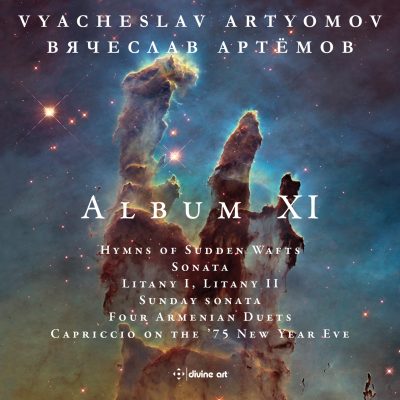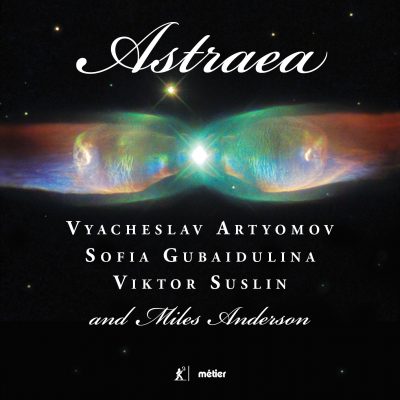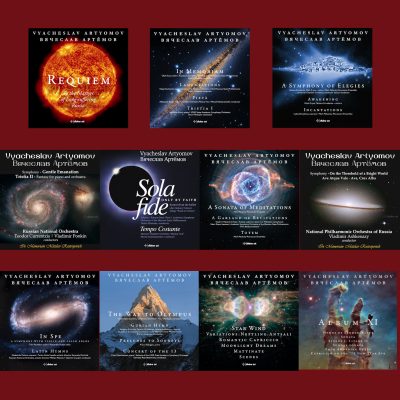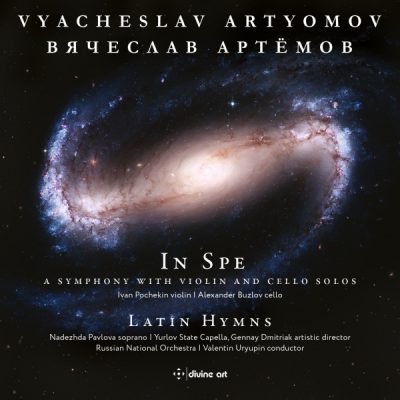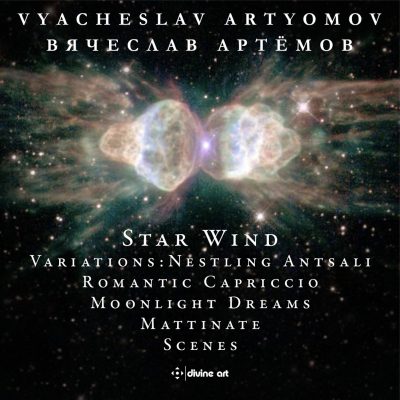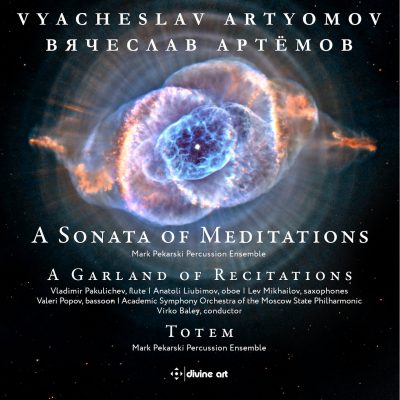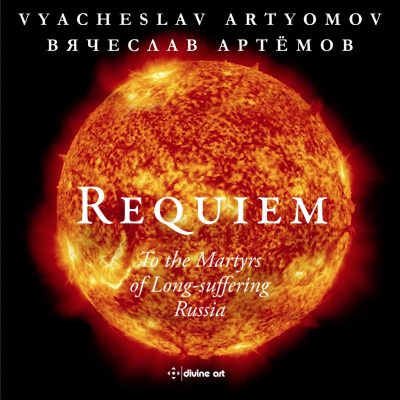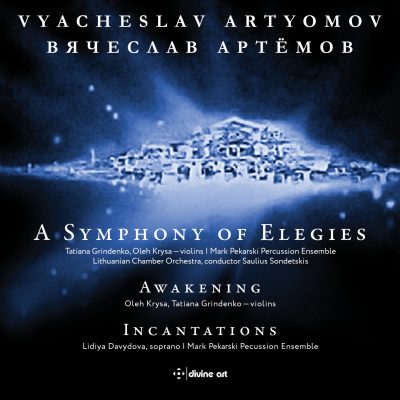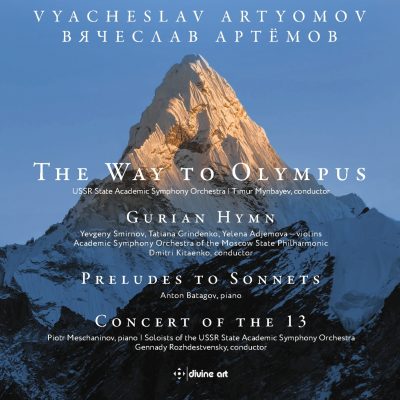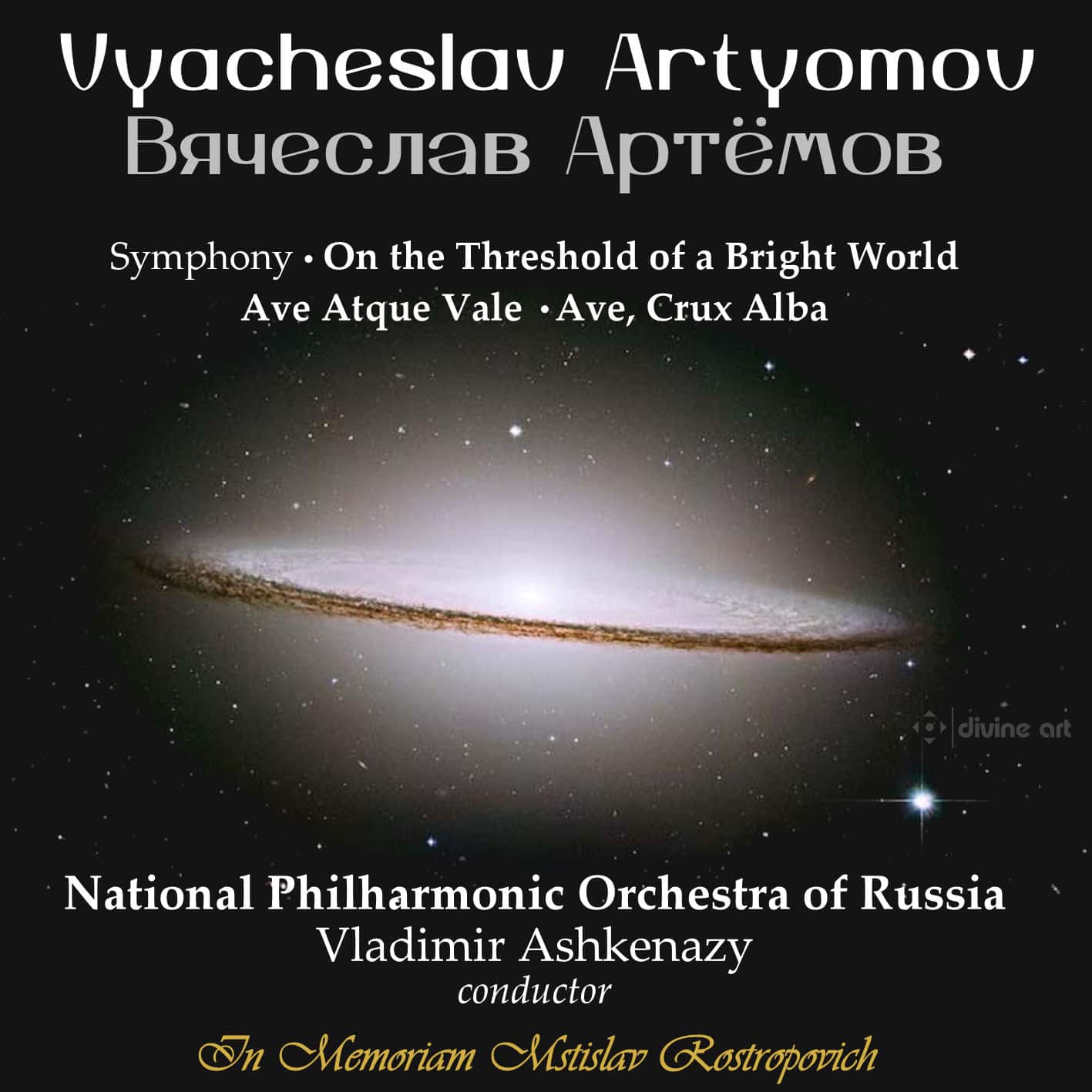Vyacheslav Artyomov Recordings
Vyacheslav Artyomov’s life under circumstances of unrecognition, official defamation and exclusion from livelihood and — what is no less important — spiritual loneliness, is truly heroic, and music, created by him in such a totalitarian country is an extraordinary feat.
Mikhail Tarakanov, professor at the Moscow Conservatory, wrote about Artyomov’s works: “Artyomov, this master of music who had been unrecognized for decades, proved that not being recognized in Soviet Russia testified to one’s noble sentiments, profound feelings and deep emotions. At the same time the failure to appreciate his genius shows clearly the spiritual indifference, the atrophy of religious and moral sentiments and the dreadful moral decline in a society which was governed by an atheist system for many years. In this sense one could say that Artyomov was ahead of his time in many ways.”
It was Artyomov’s strong wish to become a physicist, while also studying music concurrently; however at a decisive time in his life, the pursuit of music came to be his principal focus. He first attended the composition class of A. Pirumov, then graduated from the Moscow Conservatory after studying composition with Nikolai Sidelnikov and piano with Toviy Logovinsky.
As a young composer, he developed a profound interest, successively, in Russian folklore, traditional music of the East, the works of Prokofiev, Stravinsky and Messiaen, and the Polish avant-garde. But it was Arthur Honegger’s Symphonie Liturgique, as well as the works of Edgar Varèse and Sinfonia by Luciano Berio that made the greatest and most lasting impression on him.
In 1975 together with the composers Sofia Gubaidulina and Viktor Suslin, he formed the improvisation group “Astreya”, whose purpose was to improvise on non-orchestral and exotic instruments, mostly from his own private collection. “Astreya” became quite successful, made studio recordings, participated in recording music for a major feature film of Elem Klimov “Farewell” and performed before small select audiences of enthusiasts.
For many years, political conditions in Russia mitigated against his works being performed with any regularity, if at all. This was true even in 1979 when his compositions began to become a regular feature of major European Festivals and various concert venues, including several in Paris, Cologne, Venice, Warsaw and London. He was blacklisted as one of the “Khrennikov’s Seven” at the Sixth Congress of the Union of Composers for his unapproved participation in some festivals of Soviet music in the West. The tone of the denunciation harked back to the First Congress of 1948, at which Prokofiev, Shostakovich, Myaskovsky and others were victimized. This ruling immediately deprived Artyomov of any performances or publications as well as earnings. Notably, nine years later, Khrennikov, then chief of the Union of Composers bureaucracy, after the premiere of Artyomov’s Requiem changed his opinion on Artyomov’s music saying: “Artyomov is an outstanding composer. His Requiem has raised Russian music to a previously unattainable height. I’m sure it is due to Artyomov that we have not only reached the European level in this genre, but surpassed its acmes — the Requiems by Mozart and Verdi”.
Nevertheless, in spite of the relentless opposition of the Soviet bureaucracy in the early 80s Artyomov began his own musical “perestroika”, and with the help and participation of his wife, the poetess Valeriya Lyubetskaya, he was able between 1981-86 to organize a series of performances of his own music, using some of the best Soviet performers – including such brilliant musicians as Oleh Krysa, Liana Isakadze, Dmitri Alekseyev and Saulius Sondeckis, amongst others. These performances were very successful, and some of them were even recorded by the All-Union Radio. At the same time, Artyomov also managed to make wonderful recordings with the aforementioned artists, as well as other excellent musicians, such as Dmitri Kitaenko, Timur Minbayev, and Tatiana Grindenko.
Artyomov has participated in many European festivals since 1979. Festivals of the composer’s work have taken place in Moscow (“Festival of Premieres”, 1994) and Amsterdam (“Artyomov-festival”, 1997). His music has also been performed by conductors Mstislav Rostropovich, Gennady Rozhdestvensky, Vladimir Fedoseyev, Mikhail Pletnev, Vladimir Spivakov, Teodor Currentzis, Vladimir Ashkenazy and Virko Baley, by pianists Stanislav Bunin, Philip Kopachevsky and Ricardo Descalzo, cellists Aleksandr Rudin and Aleksandr Buzlov, organists Oleg Yanchenko and Aleksei Semionov. He has also collaborated with such recognized singers as Liubov Petrova, Lidiya Davidova, Marina Meshiariakova and N. Lee, as well as many outstanding woodwind and percussion players.
His works were nominated for the State Prizes in Russia and prestigious prizes in the US.
Artyomov’s works have been released on more than 30 CDs in the USA, UK, Germany and Russia. Currently (2018) Divine Art is preparing the reissue of six albums of Artyomov’s music previously released by Melodiya and Bohème.
Russian TV have made and broadcast about 15 films and programs about Artyomov’s music, including a three-part film on his Requiem (produced by V. Artyomov, RTR, 1994).
A number of books have been written about the music of Vyacheslav Artyomov including: “Artyomov – An essay on creation” by M. Tarakanov (Moscow, 1994) “On the way to the new spirituality” by M. John (Berlin, 1996), “The music of Vyacheslav Artyomov” by Robert Matthew-Walker (St.Austell, 1997), a book of poems “The book of radiance” by V. Lyubetskaya (Moscow, 2000) and “Russian composer Vyacheslav Artyomov” by A. Kloth (Essen, 2009).
His works have been published by “Kompozitor” and “Sovetskiy kompozitor” in Moscow and by C.F.Peters in Frankfurt. His Selected Works began to be published in 2000 in Moscow (8 volumes were issued). Artyomov is a Full Member of the Russian Academy of Natural Sciences(since 1996), President of the Foundation for Spiritual Creation, and holder of the Order of Friendship (2010). “Man of the year – 2016”.
The musical philosophy of Artyomov
Artyomov’s compositions show his interest in the archaic (“Incantations”, “Totem”) and Christian motifs (“Requiem”, “Ave, Maria”) as well as Eastern meditation (“Awakening”, “A Symphony of Elegies”, “Moonlight Dreams”). Both cycles of symphonies — the great tetralogy Symphony of the Way and the trilogy The Star of Exodus are written in a new significant, sublime and sweet style — stile nuòvo grande, sùblime e soave.
In spite of many different influences, Artyomov considers himself, in spirit, to be an adherent of the Romantic Tradition. He prefers not to call his music by such an indeterminate word as “contemporary”: he uses a specific term to include it into the overall tradition — “musica perennis” (eternal music). This Tradition has as its first subject the expressing of all the poignancy of emotional experience, the most secret depth of man’s existence — not as a psychological exercise but for the achievement of the super-real being. For Artyomov, all elements of musical language attend to one main purpose – penetration into the deepest levels of an inner world, discovering the “Other World” in oneself. The process of obtaining knowledge of this world can be a way of the mutual moral perfecting of both composer and listener: Artyomov believes in the transfiguration of the created world through music. As the composer says, “music is the only way for the cognition of the sense of existence”.
Artyomov considers music a science — the concentration of the soul’s experience — and, side by side with astrophysics, one of two main fundamental sciences: astrophysics broaden the horizon of knowledge of the Universe, and music exposes the profundity and strength of human’s spirit, his interconnection with the World’s Soul (Anima Mundi). Music is the highest achievement of human’s spirit, “a mediator between God and man”, “a concentrate of spiritual energy, which should awaken man’s ethical understanding and purify his soul. Music is a science sui generis — a cosmology of spirit. It does not need speculations or logical descriptions. It brings insights, and this experience is expressed directly by sounds”. “Creation of music is man’s answer to God, the supreme act of love and repentance. Truth is in beauty. Beauty justifies man, it is the revelation of his divine nature” (according to Artyomov’s Foundation of the Philosophy of Music).
Culture is the aim of the development of our world. World Spirit, assimilated by a person, is concentrated in culture, which is the only thing that remains after we leave. A person, being created ‘in the likeness’ of God, is justified by his creative activity.
Serious music is created by spirit and for Spirit. Music is the real concentration of human’s spirit and as such — the incarnation of Saint Spirit. Therefore music is the greatest value in the hierarchy of values — and the only.
Artyomov’s music
The main body of Artyomov’s work consists of about 70 titles, but these do not include some dozen instrumental and orchestral pieces written for specific occasions, as well as music for films and theater.
His principal works include:
- the internationally acclaimed Requiem, dedicated to the “Martyrs of long-suffering Russia”, for six soloists, two choirs and large orchestra with organ, which was premièred in Moscow in 1988;
- the tetralogy “Symphony of the Way” for large orchestra with organ, comprised of four symphonies: “The Way to Olympus” (dedicated to poetess Valeriya Lyubetskaya and premiered in 1986, Moscow), “On the Threshold of a Bright World” (dedicated to the National Symphony orchestra and its musical director Mstislav Rostropovich), given its première in 1990 in Washington D.C.), “Gentle Emanation” (the final version dedicated to Vladimir Spivakov and premièred 2010 in Moscow), and “The Morning Star Arises”, dedicated to the London Symphony and first performed in London in 1993;
- a cycle of symphonies “The Star of Exodus” with soloists and large orchestra, comprising to date ”In Memoriam” (1984) with violin solo, “In Spe” (2014) with violin and cello solos, and “In Gloriam” (in progress) with choir and two piano solos; works for orchestra with soloists: “A Symphony of Elegies” (1977), “Gurian Hymn” (1986), “A Garland of Recitations” (1981), “Tristia I” (1983), “Tristia II” (1998, rev.2011), “Pietà” (1996), “Latin Hymns” (2003);
- works for chamber ensembles including “Star Wind” (1981), “Hymns of Sudden Wafts” (1983), “Incantations” (1981), “Moonlight Dreams” (1982), “Northern Songs” (1966), “Totem” (1976), “Scenes” (1971), and “A Sonata of Meditations” (1978);
Artyomov has also composed music for two ballets: “Expectations”, in one act, after paintings of Antoine Watteau, and “Sola Fide” (“Only by Faith”), a three-act work based on Aleksey Tolstoy’s novel “The Road to Calvary”.
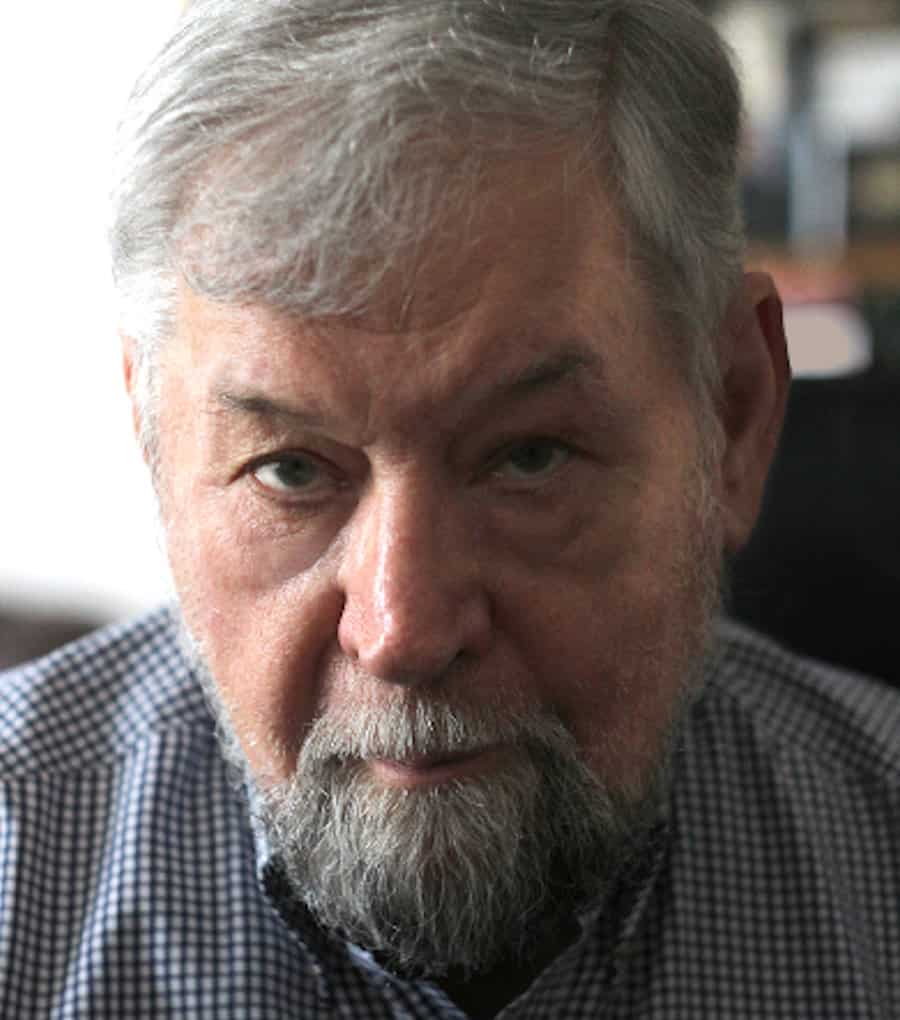
Works by Vyacheslav Artyomov
- Archipelagos of Sounds in the Ocean of Time
- 4 Armenian Duets
- Ave Atque Vale
- Ave, Crux Alba
- Awakening
- Capriccio on the ’75 New Year Eve
- Concert of the 13
- Death Valley
- Dolcissimo
- Garland of Recitations, (A)
- Gurian Hymn
- Hymns of Sudden Wafts
- In Memoriam
- Incantations
- Lamentations
- Latin Hymns
- Litanies I & II
- Mattinate
- Moonlight Dreams
- Pietà
- Preludes to Sonnets
- Requiem
- Romantic Capriccio
- Scenes (Grand Pas)
- Sola Fide – Ballet Suites
- Sonata (clarinet solo)
- Sonata of Meditations, (A)
- Star Wind
- Sunday Sonata
- Symphony of Elegies, (A)
- Symphony: Gentle Emanation
- Symphony “In Spe”
- Symphony: On the Threshold of a Bright World
- Symphony: The Way to Olympus
- Tempo Costante
- Totem
- Tristia I
- Tristia II
- Variations: Nesting Antsali

